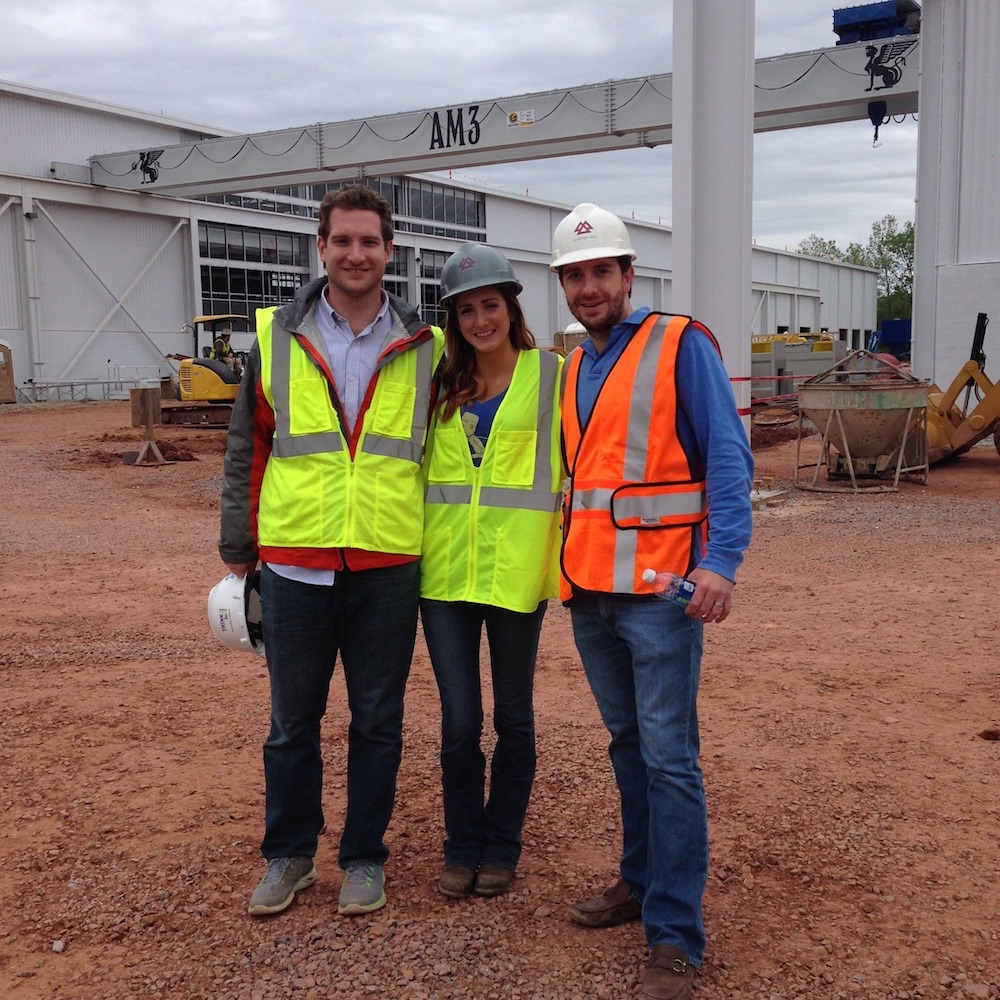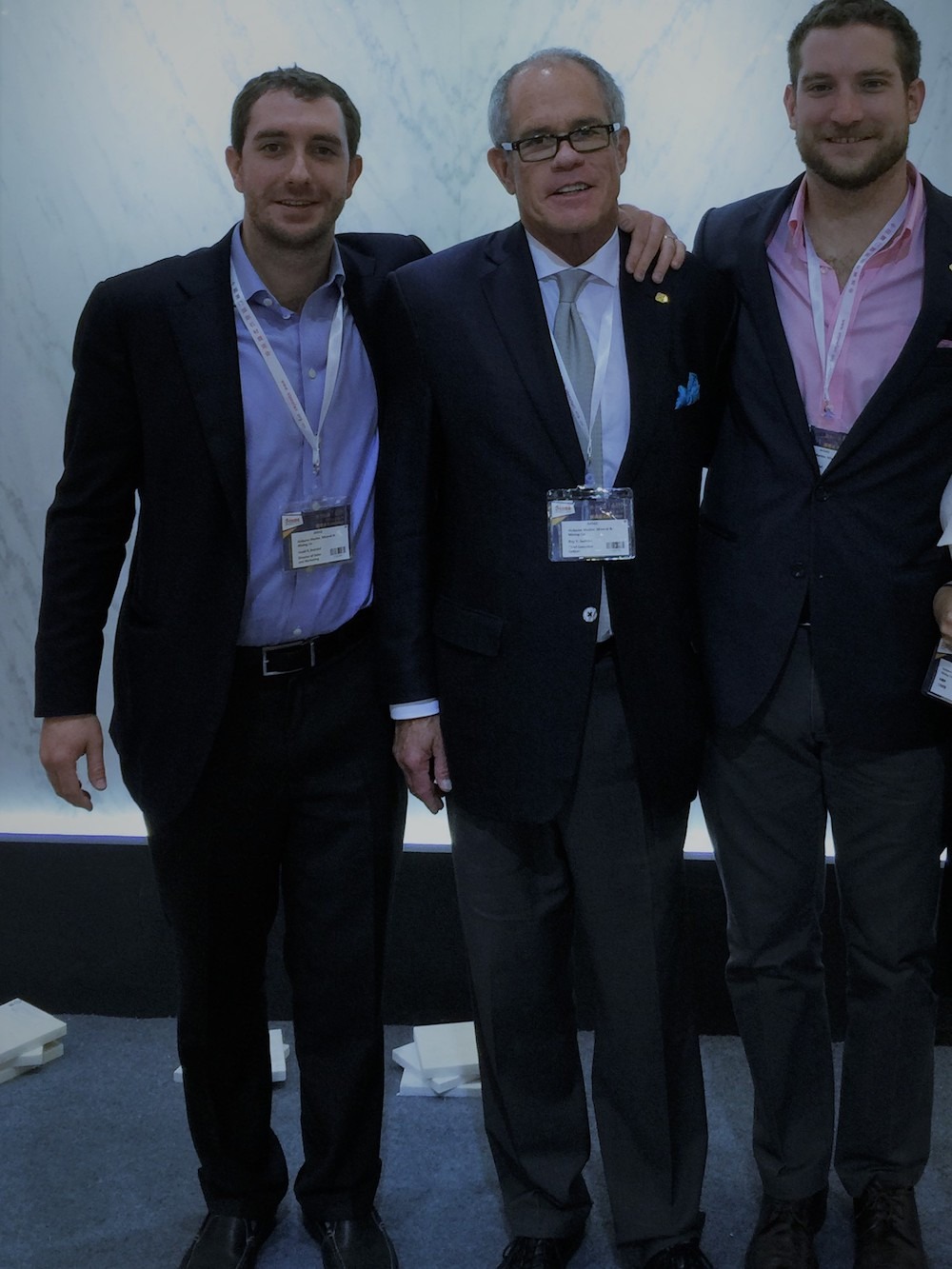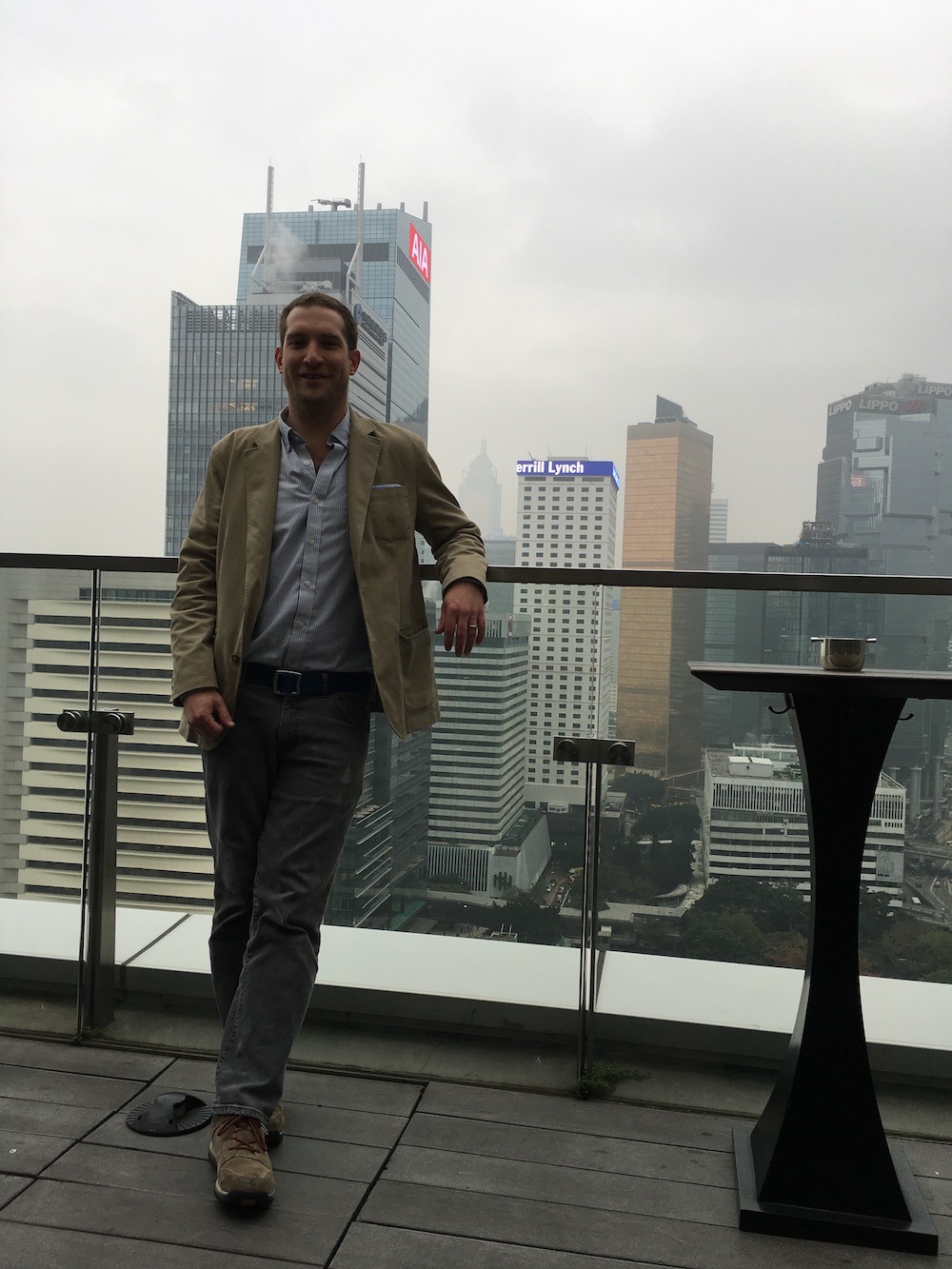In our sixth GEN NXT interview, I had the opportunity to chat with John Swindal of Masonry Arts and the newly started Swindal Group. It was such a pleasure to learn more about him, his story and background in the industry. I’d like to thank him for taking the time to speak with me on my very first GEN NXT interview. We also thank JagClamp for continuing to sponsor this important series.
Bronzella Cleveland: Let’s start out with a little bit about your background and how you got into the industry.
John Swindal: My great grandfather started out in the industry, his name was John Victor Swindal and he was a brick mason in Alabama years and years ago. About 65 years ago my grandfather started his first masonry business called John Swindal Masonry. Then my father followed in his footsteps and founded Masonry Arts in 1979, so grandfather and father worked together in Masonry Arts until my grandfather retired. Which was about 10 years ago, so they worked together at Masonry Arts for 30 years. I became involved in Masonry Arts initially as the laborer, then as an apprentice brick mason, then a project manager/estimator, all the way through from the ground up so to speak with Masonry Arts.
I started working in the summers when I was 14, I wasn’t supposed to be, but I was definitely working when I was 14. Accounts payable to accounts receivable, and then as soon as they thought I could get away with it, they put me a job site. I worked in the field every summer and break until I finished college. When I finished college I went to work for Masonry Arts full time, I was involved in the Glass and Glazing Division the company has for about two years. Then I went to law school and business school at a local university in Birmingham, AL. I spent three years to get my law degree and MBA. When I finished in 2007, I went back to work fulltime at Masonry Arts until late 2014. At that time my father and I were running a stone quarrying and stone manufacturing business for an international investor. So I was working for both Masonry Arts and the Alabama Mineral Mining Company, I worked for them for about two and a half years.
Then recently I started my own company, called the Swindal Group. I’m still with Masonry Arts, but I started a consulting firm to consult with business plan creation and revision, contract placing and negotiation, risk mitigation, risk identification. Basically anything that involves risk on the front end of a job or the middle or end of a job. Litigation avoidance and strategy, document review, and also general business planning, there isn’t a whole lot of help given to the specialty contractors. My dad is helping me along. We’re also going to do some investigations that are associated with litigations, construction defect investigations and advice, constructability assessments, just a wide variety of services for mason and stone installation contractors.
B.C.: What are some of your earliest memories working with your family?
J.S.: I used to go with my grandfather on the weekends, we’d drive down to the office and I’d spent hours wandering around the equipment yard. Climbing into Pettibones, lulls, forklifts, and playing around with scaffold bucks— nothing dangerous you know. But I spent a lot of time on the weekends wandering around the equipment yard. He’d also take me around on Saturday and Sunday if there wasn’t anything going on, and if Masonry Arts had any jobs going on, I’d go to jobsites with him. You know in the hard hats, I’d walk around and talk to the foreman. I was doing that since I was out of a car seat. Eventually I started doing that with my dad until I was able to go in and start working.
B.C.: You mentioned you started working when you were 14, were you ever given a hard time by the other guys on jobsites?
J.S.: Well, I was originally. I learned at a very young age that when you are the boss’ son/grandson, the best way to earn respect is to show up early and to stay late and most importantly to ask questions. I never pretended like I knew everything, I always knew that the important thing is to ask questions. Especially when you’re 15/16 years old and don’t know how to do things, the best thing is to use the wisdom and knowledge of those around you. So I was never hesitant to ask questions, I ate lunch with the guys, I spent as much time as I could with the guys— before, during and after work. In most instances you can learn from a laborer who’s shaking out stone, mixing mortar, organizing the job, than you can from the foremen who is running the job. It’s important to sort of systematically go through and ask everybody, not what they’re doing, but why you’re doing it— that’s the best way to learn and earn their respect. Not that I didn’t get a hard time occasionally, because I did, but instead of getting defensive about it I decided to take it in stride. And laugh with the guys rather than hide or tuck my tail and go tell on them.
B.C.: So lets jump ahead, how did you get to where you are today?
J.S.: Without Masonry Arts and the masonry industry I wouldn’t have been able to go to college, law school and business school. It’s a combination of the education and the experience I’ve had working with my father. When I was 27 and right out of law school the Vice President of Operations for Masonry Arts left to take another job. So I was thrust into a very important position at a very young age. I again was forced to start asking questions to people who knew a lot more about the business than I did. So I understood [luckily] that there are people that work for my father then and work for my father now, everyone has strengths and weaknesses. I attempted to take the good points from everybody that I was working with, including my father and sort of weeding out some of the bad characteristics some of them had. Whether it was estimating, or project managing, or operations, and try use everybody’s strengths and really turning into the person who I am today. It’s a combination of education and being thrust into a management position at an early age. Working with Masonry Arts has provided a unique opportunity for me to learn.
B.C.: You’re unique in this industry; you have your MBA and a law degree. How do you tie those degrees into working in the industry?
J.S.: I think in the industry it’s unusual to have an attorney on staff. Masonry Arts is lucky to have and attorney on staff, I don’t know if it’s lucky that it’s me. I would think my father would tell you it’s been really advantageous, I apply both my law degree and my MBA almost daily. Whether it is at Masonry Arts or in my own business, which I’m getting off the ground. But with Masonry Arts, whether it’s reviewing a contract, advising a project manager on how to deal with a potential conflict. Or even advising a foreman of a potential conflict, or general superintendent, it’s been very useful. Not to say that I’m filing lawsuits because I’m not, I’m not a litigator, I just do transactional work only, I think it’s useful to keep us out of trouble. I don’t know how many times I’ve gone to ASA conferences or even MCAA conferences. A lawyer is always going to tell you the best contract is the one you don’t sign. All of us who have been in the business know you have to sign contracts you don’t want to, because you have to pay your bills.
I think that’s one important thing we need to do, we have to sign contracts without a general contractor agreeing to, or having suggested changes. It’s a lot easier to manage your contract if you understand it when you have to sign one. I think my legal education has really helped us to protect ourselves in those instances when you have to sign a contract just to pay the bills, which is something that you will have to do.
B.C.: What interests you about the industry?
J.S.: I’ve been in the industry since I was a kid, at some point in high school and even college, I could remember saying the one thing I didn’t want to do is go back to Alabama and be involved in the masonry industry. That’s part of the reason why I went so far away to college, but part of what still attracted me to the industry at the end of the day there’s a physical manifestation of your work. When you leave a jobsite you can see you’ve laid 1,000 brick in a day or you’ve laid 200 blocks in a day. Everyday when you leave your job there’s a physical manifestation of what you’ve accomplished. That’s very unusual because typically with a lawyer, there’s no physical manifestation of the work they’ve put in, unless it’s dollars. But for a mason contractor or any specialty subcontractor, it’s important and great to see what’s been accomplished. You can drive anywhere in Birmingham, Alabama or further on the Southeast of the United States and see the work Masonry Arts has built over the course of the last 40 years. With my grandfather going back 30 years, which is cool.
The industry needs organizations like the MCAA going forward there are so many big picture issues like the silica issue, contractual issues, pay causes, damages for delay causes. This is where typically general contractors and owners seem to have a lot more lobbying powers and in some states it is very difficult for subcontractors to be able to have a fair competitive landscape without training issues. We’re having real training issues here in Alabama right now, we just don’t have a training course and I know that endemic in the industry. I don’t know how to solve the problem, but I know organizations like the MCAA can put enough smart people in a room together and if they stay together for an extended period of time we can at least move forward and start diagnosing it.
B.C.: How is it working with your family?
J.S.: There have definitely been some rocky periods, but overwhelmingly it’s been very positive. We don’t always agree but we respectively disagree, there’s never any argument that lasts while the argument is ongoing. I feel that we do a really good job compartmentalizing work and family time and we’ve gotten better at that as we’ve gotten older. We try not to take work issues home and now it’s getting easier now, I’m still very much involved with Masonry Arts, but I’m getting the Swindal Group started. So now when I talk to my dad, more than half of it is work related, but a good bit is family related, because I moved up to Rhode Island with my family. My dad is still in Alabama, so he’s sort of my lifeline to our family there. I think because we’ve gotten older we can compartmentalize better, but we always could. I think it was mostly because of my grandfather. He was a calm and reasonable person, not that my dad isn’t, they just have very different leadership and management styles. Early on in my career he was able to act as a mediator for my father and I, so we were able to really work well together. We have different strengths and weaknesses, and we look at problems and solutions differently, because of that we’ve been able to work together.
B.C.: Have you worked with younger people at your company? How have those experiences been?
J.S.: I’ve found that younger people are either 100% dedicated and committed without question or they are interested in only themselves. There’s no in between with younger people, I feel they’re either all in, ready to get their feet wet. Or there’s an entitlement there, as if they feel they don’t need to go to the jobsite. I think the biggest challenge with the younger generation is their reluctance to pick up a telephone or get in their car and actually go and talk to a client. Whether it’s the general contractor or a project manager wanting to talk to the foreman. A lot of times now most of our foremen get a lot emails and they’re not great at email correspondence, but they are replying to them. The younger generation will just use it as a crutch, they get attached to their email and some times you have to use email. Granted given my position, I understand that there is a time and place to email. But there’s also still a time and a place for personal contact through a phone call or most importantly through face-to-face contact. I feel like that’s been lost.
B.C.: Yeah, we are in a digital age.
J.S.: Yeah, I mean I catch myself too; it’s much easier to just send an email or text message, because you do it on your own time. It’s a five-minute exercise or a five second exercise, rather than a 20-minute conversation. It’s necessary to actively go back and forth with somebody on the telephone or face-to-face, it’s really the only way to hash out problems. It’s unusual if not impossible to solve a problem with various issues in an email or a text message, and the younger generation doesn’t seem to accept it. Because I don’t think they’re lazy, I don’t think they’re any lazier than any other generation that came before them. I just think it’s much easier to rely on technology.
B.C.: Lets talk about how you got involved with the MCAA and the benefits you’ve seen from being involved.
J.S.: Golly, I started going to MCAA conventions when I was able to walk. I think John Swindal Masonry was in the MCAA. I mean my family being involved in the MCAA goes back a long way, and as I got older I got much more involved. When I started worked for AM3 (Alabama Mining and Mineral Company) I didn’t have as much time to dedicate to Masonry Arts or the MCAA. But I guess it was 10 years ago I went to one of the legislative conferences in Washington, which I think those things are very important. I’m a firm believer that trade organizations like the MCAA are very important to band together for important causes and interests, and also to get a good sense of what’s going on in other parts of the country. Whether it’s training or composition of labor force, even legislation is changing. Even though Masonry Arts is based in Alabama and I live in Rhode Island, legislative changes in Rhode Island or Alabama can eventually reach the other state and any other part of the country. Sometimes there are parts of the country that are on the cutting edge of technology or legislation that other people can learn from and the only way to really learn from other people to is be apart of an organization like MCAA. It gives you access to people from all across the country, big contractors, small contractors, a sampling of anyone and everyone, and it’s important to learn from everyone and to be able to teach others.
B.C.: Do you have any advice for people who are interested in the industry?
J.S.: It’s very important to spend some time in all aspects of the industry that you can. I realize I was in a unique position as the “boss’ son” but if you’re going to get involved in the masonry industry especially, I’ve learned you should go out in the field and when you’re in the field talk to everybody. Talk to your laborer, talk to your equipment operators, the bricklayers, talk to the foreman, and then spend time in the office. Spend time with the administrative staff, and accounts receivable and payable, not jut the estimators and project managers. Spend time with everybody you possibly can and learn as much as you can, don’t put yourself in a silo where you’re just a field guy or just an office guy or lady. I would say the more exposure you get in an entire organization the better off you’ll be.


